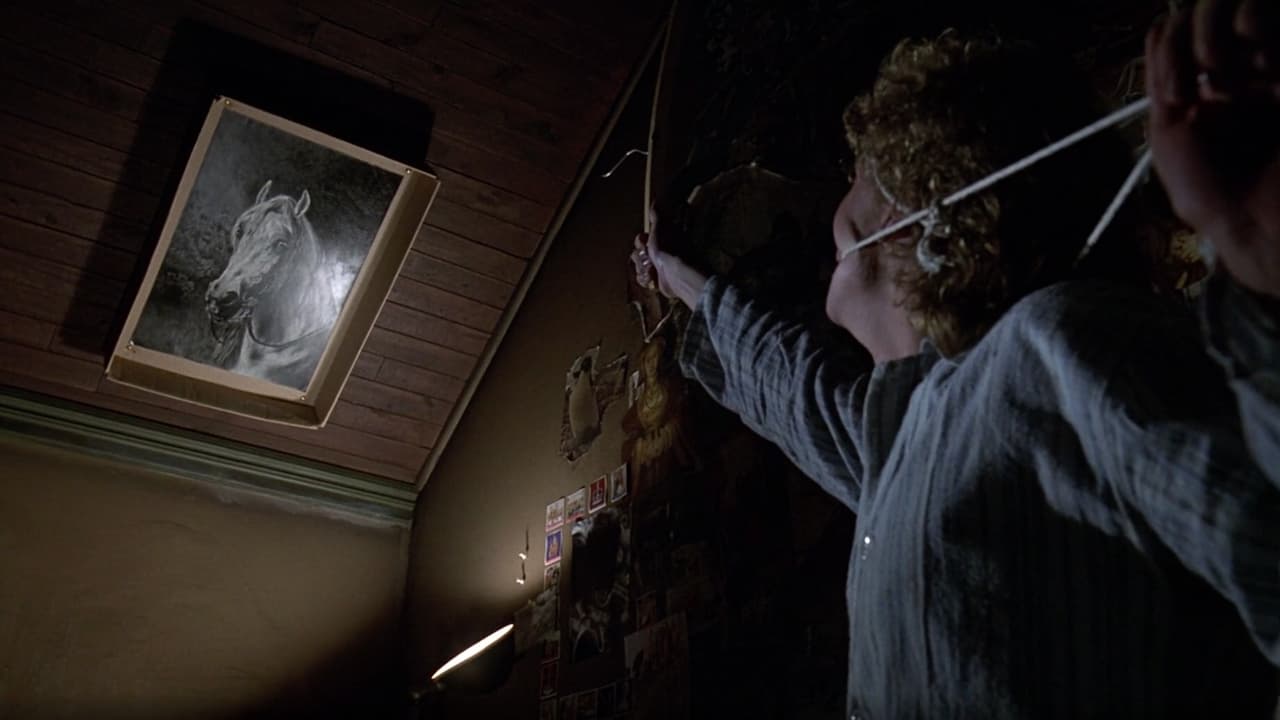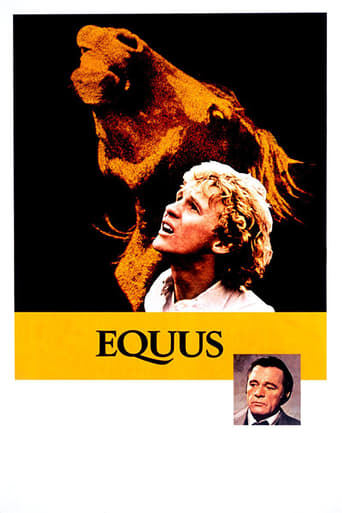Cathardincu
Surprisingly incoherent and boring
Kirandeep Yoder
The joyful confection is coated in a sparkly gloss, bright enough to gleam from the darkest, most cynical corners.
Jakoba
True to its essence, the characters remain on the same line and manage to entertain the viewer, each highlighting their own distinctive qualities or touches.
Ginger
Very good movie overall, highly recommended. Most of the negative reviews don't have any merit and are all pollitically based. Give this movie a chance at least, and it might give you a different perspective.
Larissa Pierry (tangietangerine)
Watching this film was truly like seeing one of Freud's cases brought to life, as I'm sure they wouldn't deny the inspiration. It also succeeds in giving us a sense of reality, it feels like real pain, real angst...especially if we take a look at Richard Burton's initial monologue, lines delivered so intensely. The sorrow in his eyes repeating his tormenting questions to us, which will never be answered. Even though patients may be "cured" and go on with their lives, that element of mystery will always remain...but why did it happen like this? what are the odds that something like this ever afflict a boy in such a wild manner? Peter Firth is great as well, at times his acting (and his physical traits) reminded me of Malcolm McDowell in A Clockwork Orange. I would say playing Alan Strang's part was as bold as playing Alex DeLarge, given its exposition and demanding surrender to the part. The movie gives us a detective task, which is to take all of those fragments of Alan's life and dare to put it together, to make some sense. Lots of speculations cross our minds, is his obsession with horses the product of sexual repression? of the ultra-religious aspects of his primary relations? both? we are left unanswered, as we watch Dr. Dysart be put to test against Alan's provocations. That is also an interesting example of how a doctor-patient relationship can develop. It was a challenge the doctor wasn't expecting to face, after so many years of easy practice...he found out that a real relationship with a patient is made of two ways.
jc-osms
Sidney Lumet's film-dramatisation of Peter Shaffer's shocking stage-play "Equus", is an undeniably difficult, often overbearing but occasionally enlightening examination of the suppressed sexuality of a teenage boy brought up in a closeted household by two of the most repressed parents you could meet this side of Mary Whitehouse. Through the prism of child - psychiatrist extraordinaire, played masterfully by Richard Burton, the boy's dark secret as to why he blinded six horses he's employed to look after as stable-boy, comes to light in a harrowing and bloody conclusion.I've only ever seen the play once before and that some twenty years ago in an earnest and truncated version at the Edinburgh Festival and was wary of the movie not slipping its theatrical moorings as it is, on paper, a very static and wordy piece. For the first half or more however, director Lumet accomplishes this, centred round the well-dramatised recollection of the boy Alan Strang's (Peter Firth) first encounter with a horse on the beach interpolated with natural changes of location at the school, Strang's parents' house and the stables where he finds work and makes the ill-fated acquaintance of fellow-worker Jenny Agutter, who is again required to remove her clothing at a key part of the narrative (like in "Walkabout").The film is slow-moving at times and over-burdened with a little too much angst from both teacher and pupil. Firth's raising up of the horse-god "Equus" from the dark recesses of his battered consciousness and Burton's pieces-to-camera play up the artificiality of the piece too much and I also think the relationship of Strang's screwed-up parents too close to caricature - it's impossible to ever imagine them as a "normal" loving couple. I have to say too that I found the sexual imagery of the boy with the stallions a little over-the-top and unsettling too...and yet there are effective sequences too, evincing real drama and power, particularly in some of the doctor-patient exchanges between Burton and Firth, while the infamous nude scene between the young couple which immediately prefigures Strang's bloody breakdown and the gory conclusion itself, is handled surely and sensitively.As an examination of the coming of age of an emotionally crippled young man, beset by demons arising from his over-weaned childhood, "Equus" is hit and miss. Some of the main acting too, by the likes of Colin Blakely and Joan Plowright as the boy's parents and occasionally Firth himself is for want of a better word very obviously stagy. Burton does best in a showy part, deserving of his Oscar nomination but handicapped by his character's stereotypical frailties and a tendency to expostulate, particularly with the female teacher from whom's he's holding back his own sexual attraction -it's she who starts off proceedings by bringing Strang to him as the archetypal "impossible case"."Equus" in the end is more Aintree "Grand National" steeplechase than Epsom Derby sprint, with perhaps too many fences over the course, but if you're still standing at the end, there are some rewards to be savoured, particular in some of Lumet's direction and most of Burton's acting.
mari_del_mar
It's never easy to make a convincing psychological drama.There's always something that sounds faulty, because, bottom line, we humans are in the dark as to much of what goes on inside our deep selves.This movie, I think, actually uses this unavoidable flaw to its advantage.The way I see it: a masterful insight into the fear that intellect naturally feels when confronted with the terrible, magnificent, all-encompassing force that is the whole of the psyche.To quote the movie: "He's calling me out of the black cave of the psyche. I shove in my dim little torch..."
rowmorg
This is the predictable over-the-top dramatic tosh that they dished up in the early heyday of Larry's 'National Theatre', when the all-male literati still ruled London. It's loaded with all the required themes: paganism, devil worship, bestiality, Biblical delusions and psychiatry, but what it's really about is why men hate and fear a naked, willing woman, something that the production itself reinforces. A far more interesting topic, IMO, would be how women put up with screwed-up men like Alan Strang (Firth). But that would never do, would it. It's a man's world, and it's Strang who is "feeling pain", not Jill Mason (Agutter), the woman he treated brutally, before deflecting his impotent rage on to his kinky hang-up: horses. And a brilliant doctor has been persuaded to treat Strang, not Mason, who surely requires post-traumatic stress therapy. Author Shaffer cleverly introduces an ironical second layer of plot when shrink Dr Dysart (Burton) reveals that he is jealous of the madman Strang, who may be barmy, but at least he has "known passion", unlike the prosaic doctor. Probably only a cabal of gays could come up with such utter rubbish and win glittering prizes for it. But that was a generation ago, and Equus has slipped into well-deserved obscurity since then.

